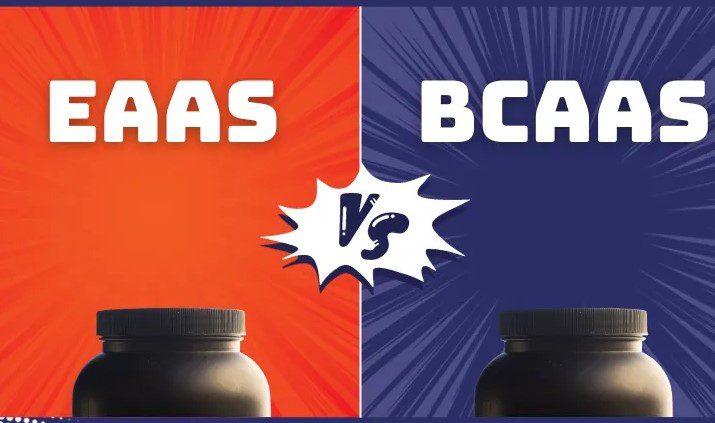Amino acid supplements have become a cornerstone in fitness nutrition, particularly for those looking to improve performance, support muscle recovery, and boost growth. Among the most talked-about supplements in this category are BCAAs (Branched-Chain Amino Acids) and EAAs (Essential Amino Acids). While both serve vital roles in the body, understanding their differences, benefits, and ideal use cases will help you choose the right one for your goals.

What Are Amino Acids?
Amino acids are the building blocks of protein. There are 20 amino acids in total, nine of which are classified as essential because the body cannot produce them on its own and must obtain them through diet or supplementation.
- Essential Amino Acids (EAAs): Include all nine amino acids the body needs for protein synthesis: leucine, isoleucine, valine, lysine, methionine, phenylalanine, threonine, tryptophan, and histidine.
- Branched-Chain Amino Acids (BCAAs): A subset of EAAs that includes leucine, isoleucine, and valine. These three are particularly important for muscle growth and recovery.
What is BCAA?
BCAAs are a group of three essential amino acids known for their unique structure and role in muscle metabolism. They are heavily used by muscle tissue during exercise, making them a popular supplement for intra- and post-workout recovery.
Benefits of BCAA Supplements:
- Stimulates Muscle Protein Synthesis
- Reduces Muscle Soreness
- Prevents Muscle Breakdown
- Provides Energy During Workouts
Recommended BCAA Products:
- Kevin Levrone Defender BCAA – 25 Servings – Offers a potent formula for recovery and endurance.
- MuscleD-IN Nutrition BCAA 30 Servings – Ideal for users seeking complete intra- and pre-workout support.
- Absolute Nutrition BCAA – 30 Servings – A great choice for hydration, recovery, and endurance.
What is EAA?
EAA supplements provide all nine essential amino acids your body needs for optimal protein synthesis and muscle repair. Unlike BCAAs, EAAs include a broader spectrum of nutrients vital for comprehensive recovery and growth.
Benefits of EAA Supplements:
- Complete Protein Synthesis Support
- Improved Recovery
- Supports Hormonal Balance and Immune Function
- Effective During Fasting
Recommended EAA Products:
- Immortal EAA + BCAA with Caffeine – 30 Servings – Combines EAA and BCAA with added caffeine for energy and performance.
- Labrada EAA – 30 Servings – A trusted blend for muscle repair and hydration.
- MuscleTech EAA Energy Sour Apple – 396g – Combines EAAs with energy-boosting ingredients for maximum workout output.

Key Differences Between BCAA and EAA
| Feature | BCAA | EAA |
|---|---|---|
| Composition | 3 amino acids (leucine, isoleucine, valine) | 9 essential amino acids |
| Muscle Building | Supports muscle protein synthesis | Supports full muscle protein synthesis |
| Use During Fasting | Limited effectiveness | More effective for muscle preservation |
| Recovery Support | Good | Superior due to full amino acid profile |
| Energy Support | Moderate | High |
When to Use BCAAs
- During Workouts
- In Caloric Deficits
- For Short, Intense Sessions
- If You Already Meet Protein Requirements
When to Use EAAs
- During Fasting or Low-Calorie Diets
- Post-Workout
- If Protein Intake is Low
- For General Muscle Building and Maintenance
Which is Better: BCAA or EAA?
While BCAAs are valuable for stimulating muscle growth and reducing fatigue, they do not provide the complete set of amino acids required for full muscle protein synthesis. EAAs, on the other hand, include BCAAs and six additional essential amino acids, making them a more complete solution.
Choose BCAA if:
- You’re already consuming enough dietary protein.
- You need a quick energy and recovery boost during workouts.
- You’re looking for a targeted intra-workout supplement.
Choose EAA if:
- You need a more complete amino acid profile.
- You’re on a restricted diet or fasting plan.
- You’re focused on overall recovery and muscle maintenance.
Can You Take Both BCAA and EAA?
While not necessary, some athletes may choose to supplement with both. However, since EAAs already include BCAAs, taking both may be redundant unless under specific training or dietary conditions. Prioritize EAAs if you’re seeking full recovery and balanced amino support.
Tips for Choosing a Quality Amino Acid Supplement
- Check for Transparent Labeling
- Look for Adequate Leucine Content
- Avoid Added Sugars and Fillers
- Consider Flavors and Mixability
Conclusion
Both BCAAs and EAAs can be valuable additions to your supplement regimen, but they serve slightly different purposes. If you’re just getting started or want a comprehensive amino acid formula to support all aspects of muscle recovery and performance, EAAs are likely the better choice. If your goal is to reduce muscle fatigue and boost endurance during workouts—and you’re already hitting your protein goals—BCAAs offer a focused and efficient solution.
For optimal results, align your amino acid supplementation with your training intensity, dietary habits, and overall fitness goals. And always pair your supplements with a nutritious diet, consistent workouts, and sufficient rest to maximize benefits.

